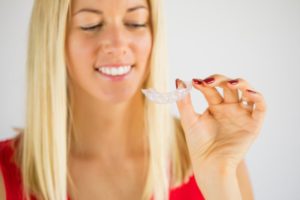
The frequent grinding and clenching of the teeth are called bruxism. Bruxism can occur when you unconsciously grind or clench your teeth while awake or as a result of a sleep disorder. These are referred to as awake bruxism and sleep bruxism respectively. Bruxism can be very painful and destructive to the teeth. Severe bruxism can lead to damaged teeth, jaw disorders, and severe headaches. Bruxism can worsen over some time without you even knowing you have it in the case of sleep bruxism. However, sleep bruxism and its effects can be prevented through the use of dental nightguards.
A nightguard is also known as a mouth guard, dental guard, nocturnal bite plate, or bite splint. It is a dental device designed to protect the teeth from injury of bruxism or during sports. Nightguards work by putting a barrier between your teeth so that when you clench your jaw, it lightens the tension and cushions the muscles in the jaw. The barrier between your teeth that cushions the muscles in the jaw do not only helps prevent face and jaw pain but also protects the tooth enamel from damage. It is sometimes impossible to know you have sleep bruxism until there are complications. Therefore, it is important to know the symptoms of sleep bruxism and go for regular dental checkups with a dentist near you. Signs of symptoms of sleep bruxism include:
- Flattened, fractured, chipped, or loose teeth.
- Grinding or clenching of the teeth loud enough to wake people sleeping around you.
- Worn tooth enamel that exposes deeper layers of your teeth.
- Increased tooth pain and sensitivity.
- Severe headache.
- Bruises from chewing the inside of your cheeks.
- Jaw, neck, and face pain.
Immediately you notice any of these symptoms, you should consult an emergency dentist in Port Charlotte.
The exact cause of bruxism cannot be determined but doctors claim it may be due to a combination of physical, psychological factors. Awake bruxism can be a result of stress, anxiety, anger, frustration, and tension. Sleep bruxism is caused by sleep disorders. Although the particular cause of bruxism can not be pinpointed, there are risk factors that could increase your chances of having bruxism. These include:
- Stress.
- Age.
- Genetics.
- Personality.
- Medications.
- Other disorders.
Nightguards are devices that are very efficient in treating bruxism. Types of nightguards include:
Soft Nightguard
This is the most commonly used type of nightguard. It is used to treat mild or occasional bruxism. It is the cheapest and most comfortable of all nightguards. It is also easy to get used to. However, it is not very durable and can be unintentionally clenched on because of the soft material with which it is made. Also, it is not a long-term solution to treating bruxism.
Dual Laminate Nightguards
This type of nightguard is suitable for moderately severe forms of bruxism. It is hard on the outside and soft on the inside. It can handle heavy clenching and grinding, lasts longer, and proffers a longer solution to bruxism. However, it tends to be thicker than other types of nightguards and harder to adjust to.
Hard Nightguards
This type of night guard is made from acrylic and is extremely rigid and durable. It is used for the severest form of bruxism and can even be used for Temporomandibular jaw disorder. It is the most durable type of nightguard. It prevents the teeth from shifting and offers the longest-term solution for bruxism. However, it is the thickest of all nightguards and is more uncomfortable than others. It can be difficult in getting used to while sleeping and needs to be ordered directly through a dentist in Port Charlotte because it requires impressions of the teeth to be made. It is also the most expensive type of nightguard.
Care For Nightguards
Dr. R Boyd Gilleland or any other Port Charlotte dentist that gives treatments of night guards near you would recommend the following for long-lasting and effective nightguards.
- Rinse your nightguard with cold water before and after every use.
- Clean your nightguard in cool, soapy water and rinse thoroughly.
- Store or transport nightguard in a firm, perforated container.
- Protect your nightguard from high temperatures.
- Check your nightguard for wear and tear occasionally.
